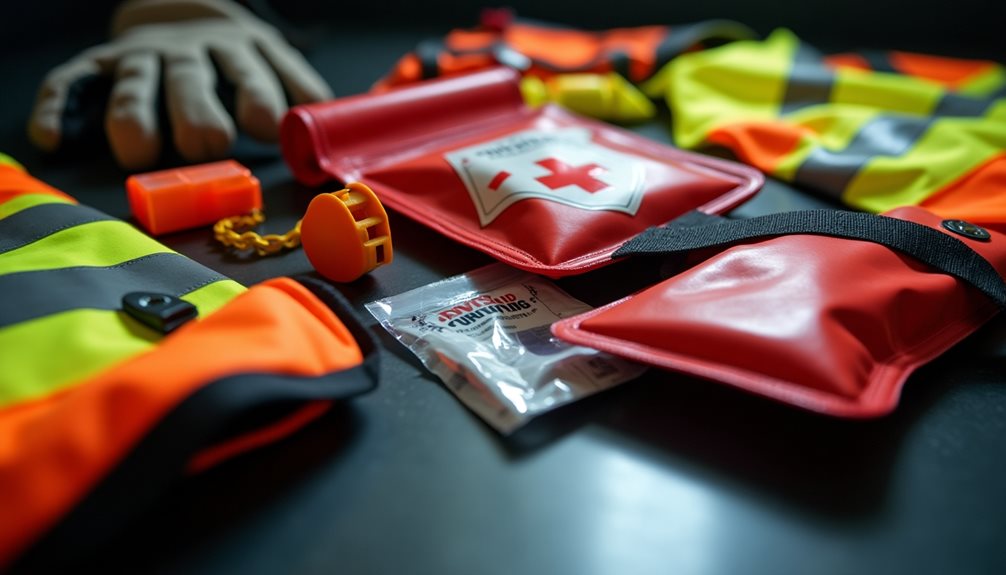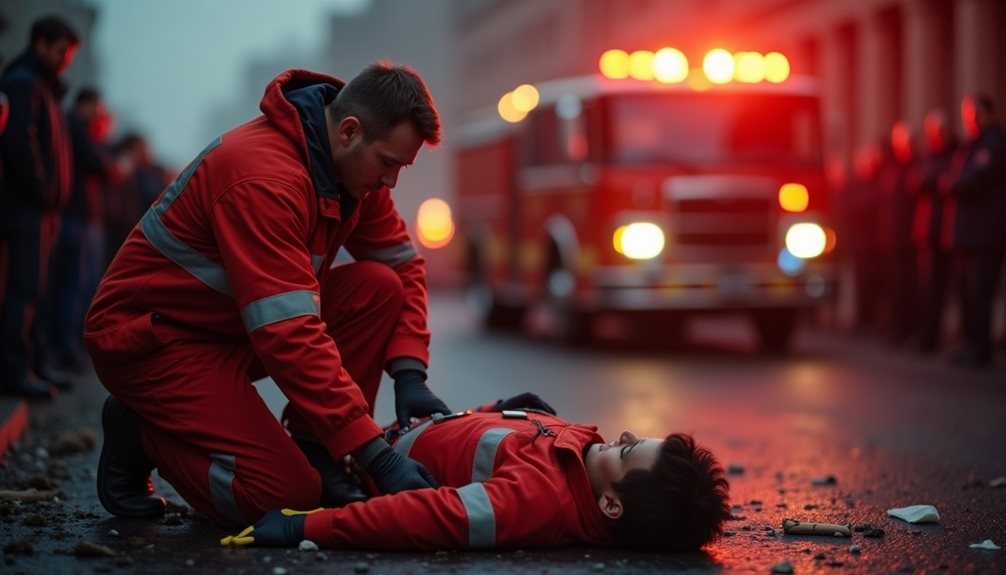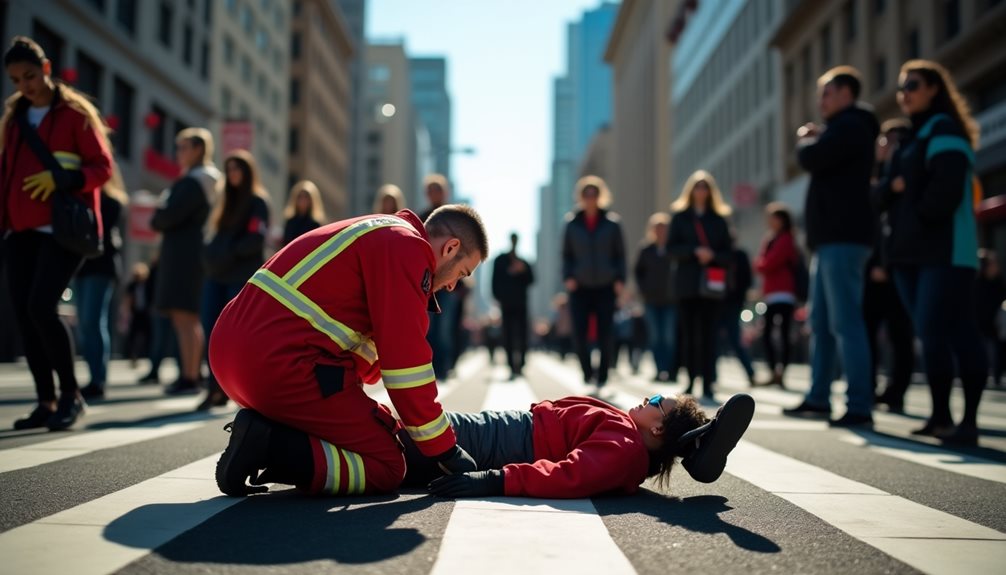Emergency and safety vocabulary in Russian encompasses important terms essential for managing urgent situations. Key phrases facilitate communication during medical emergencies, fire incidents, and natural disasters. Mastery of these terms can greatly enhance an individual’s ability to respond effectively. Understanding how to communicate with authorities and seek assistance is essential in ensuring safety. The nuances of this vocabulary may determine the difference between chaos and order in crisis scenarios. What specific terms are most important in each category?
Table of Contents
ToggleEssential Emergency Terms

Understanding essential emergency terms is crucial for effective communication and quick action during crises. In moments where every second counts, knowing what key words mean and how to use them can help save lives, prevent confusion, and ensure everyone’s safety.
Evacuation means leaving a dangerous place to reach safety. This could be necessary during fires, natural disasters, or chemical spills. In Russian, “evacuation” is эвакуация (eh-va-koo-AT-see-ya). Authorities may announce an evacuation when there is a threat to health or life, and it is important to follow instructions quickly and calmly.
First aid refers to the initial care given to someone who is injured or suddenly becomes ill before professional medical help arrives. The Russian term is первая помощь (PYER-va-ya POH-moshch’). First aid can include stopping bleeding, treating burns, or performing CPR. Basic knowledge of first aid enables bystanders to help stabilize a victim’s condition, reduce pain, and sometimes even prevent death.
An alert is a warning signal that something dangerous might happen or is already happening. In Russian, this is тревога (tre-VO-ga) for “alarm” or предупреждение (pre-du-prezh-DEN-ee-ye) for “warning.” Alerts can come in the form of sirens, loudspeaker announcements, or notifications on your phone. Recognizing and responding appropriately to alerts is critical in emergencies.
Safety equipment includes tools and gear designed to protect people from harm. Important items include:
- Fire extinguisher — Used to put out small fires before they spread. In Russian: огнетушитель (og-nye-too-SHI-tel’).
- Rescue rope — Strong rope used for pulling people to safety, especially in floods or building rescues. In Russian: спасательная верёвка (spa-sa-TEL’-na-ya ve-RYOV-ka).
- Personal protective gear — Equipment like helmets, gloves, masks, and protective clothing that shield individuals from injury. In Russian: средства индивидуальной защиты (sred-STVA in-dee-vee-du-AL’-noi za-SHI-ty).
Wearing the right protective gear can mean the difference between minor injury and serious harm. For example, a helmet can prevent head injuries during earthquakes or construction accidents.
Learning this vocabulary not only helps you understand instructions during emergencies but also empowers you to help others. Being able to identify and use equipment like fire extinguishers or rescue ropes can make you a valuable resource in a crisis.
A strong command of these terms encourages calm thinking and clear decision-making under pressure. When everyone understands what needs to be done and what tools are available, emergency response becomes faster and more effective, ultimately saving lives and reducing chaos.
Preparing yourself by learning these words in both English and Russian can be especially helpful if you are traveling or living in a Russian-speaking area, making sure you are ready to act no matter where you are.
![]()
Medical Emergency Vocabulary
Effective communication during medical emergencies relies heavily on specific vocabulary. Understanding medical terminology is essential for individuals to convey critical information swiftly and accurately.
Key terms such as “first aid” (первая помощь) and “emergency room” (неотложная помощь) must be familiar to those maneuvering these situations. Other important phrases include “call an ambulance” (вызовите скорую помощь) and “choking” (удушье), which can facilitate immediate assistance.
Recognizing symptoms like “chest pain” (боль в груди) or “loss of consciousness” (потеря сознания) is fundamental for effective triage. Furthermore, knowledge of medical equipment terms, such as “defibrillator” (дефибриллятор), can enhance response efforts.
A command of this vocabulary empowers individuals, ensuring they can act decisively during critical moments.
Below, you’ll find some of the most important vocabulary, extra examples, and a table with useful Russian emergency words, their English phonetic spelling, and their definitions.
![]()
Essential Words and Phrases
Here are some main phrases you might need in an emergency:
- “First aid” — первая помощь (per-vá-ya po-móshch)
Use when asking if someone knows how to help or if first aid is available. - “Emergency room” — неотложная помощь (ne-at-lózh-na-ya po-móshch)
Refers to the place at a hospital where emergencies are treated. - “Call an ambulance!” — вызовите скорую помощь! (vy-zó-vee-te skó-ru-yu pó-moshch)
Use to ask someone to call for emergency medical help. - “Choking” — удушье (u-dú-shye)
Describes when someone can’t breathe because something is blocking their throat. - “Chest pain” — боль в груди (bol’ v groo-dí)
Important for describing heart attack symptoms. - “Loss of consciousness” — потеря сознания (pa-tyé-rya saz-ná-nee-ya)
Used when someone faints or passes out. - “Defibrillator” — дефибриллятор (de-fi-bri-lyá-tor)
A device used to restart the heart during cardiac arrest.
![]()
Additional Useful Terms
Here’s a table with more Russian emergency terms you may need:
| Russian (Cyrillic) | English Phonetic | English Definition |
|---|---|---|
| скорая помощь | skóra-ya pó-moshch | Ambulance |
| врач | vrach | Doctor |
| медсестра | myed-sye-strá | Nurse |
| травма | trá-vma | Injury/trauma |
| кровь | krvov’ | Blood |
| рана | rá-na | Wound |
| сломанная кость | slo-mán-na-ya kost’ | Broken bone |
| ожог | a-zhók | Burn |
| отравление | ot-ra-vlyé-nie | Poisoning |
| аллергия | al-lér-gi-ya | Allergy |
| лекарство | le-kár-stvo | Medicine/drug |
| температура | tem-pe-ra-tú-ra | Temperature/fever |
| дышать | dy-shát’ | To breathe |
| не могу дышать | ne ma-gú dy-shát’ | I can’t breathe |
| помогите! | pa-mo-gí-te! | Help! |
| болит | ba-lít | It hurts |
| сердце | syér-dtse | Heart |
| потерял сознание | pa-tyer-yál saz-ná-ni-ye | Lost consciousness |
| остановка сердца | as-ta-nóf-ka syér-dtse | Cardiac arrest |
Knowing these terms can make a big difference in a real emergency. Practice saying them aloud and learn to recognize them in conversation or on signs.
![]()
Fire Safety Vocabulary
Fire Safety Vocabulary: Essential Information and Russian Keywords
Understanding fire safety vocabulary is crucial because it helps everyone respond effectively in emergencies. The right words and knowledge can save lives, reduce injuries, and protect property. Let’s look at the main concepts, expand on them with more details, and introduce useful Russian words and phrases for each key topic.
Fire Extinguisher Types
There are several types of fire extinguishers, each created for specific kinds of fires. Using the correct one is vital—using the wrong extinguisher on a fire can make things much worse.
- Water Extinguishers
Water extinguishers (водные огнетушители, [VOHD-nyye og-ne-too-SHEE-ty-lee]) are best for Class A fires—these are fires involving everyday materials like wood (дерево, [DYEH-ree-voh]), paper (бумага, [boo-MAH-ga]), or cloth (ткань, [tkahn’]). Water cools down the materials and stops the burning. However, water should never be used on electrical (электрические, [eh-lehk-TREE-chee-skee-ye]) or flammable liquid (горючие жидкости, [gah-RYOO-chee-ye ZHID-kas-tee]) fires because it can spread the fire or cause electric shocks. - Foam Extinguishers
Foam extinguishers (пенные огнетушители, [PYEN-nyye og-ne-too-SHEE-ty-lee]) are effective on both Class A and Class B fires. Class B fires involve flammable liquids like gasoline (бензин, [byen-ZEEN]) or oil (масло, [MAHS-lo]). Foam creates a thick blanket over the burning surface, cutting off oxygen (кислород, [kees-la-ROHD]) and stopping the fire from reigniting. - Dry Powder Extinguishers
Dry powder extinguishers (порошковые огнетушители, [pa-rash-KOH-vye og-ne-too-SHEE-ty-lee]) are the most versatile. They work on Class A, B, and C fires. Class C refers to gas fires (газовые пожары, [GAH-zo-vye pa-ZHAH-ry]). Dry powder interrupts the chemical reaction in flames. However, after using this type of extinguisher, you’ll find a lot of residue (остаток, [a-STAH-tok]), which can harm electronics (электроника, [eh-lehk-TROH-nee-ka]) and is difficult to clean up. - CO₂ (Carbon Dioxide) Extinguishers
CO₂ extinguishers (углекислотные огнетушители, [oog-lee-kees-LOHT-nyye og-ne-too-SHEE-ty-lee]) are made for electrical and Class B fires. Carbon dioxide removes oxygen from the fire area and cools down flames. These don’t leave any residue behind, so they’re safe for use on computers (компьютеры, [kohm-PYOOT-e-ry]) and other electrical equipment (электрооборудование, [eh-lehk-tro-ah-bo-roo-DOO-va-ni-ye]).
Knowing which extinguisher to use can prevent accidents. For example, spraying water on a burning oil pan can cause the oil to splash and spread the fire further. Using a CO₂ extinguisher on paper will likely not be as effective as using water or foam.
Smoke Detectors
Smoke detectors (детекторы дыма, [deh-TEHK-to-ry DY-ma]) are small devices that warn you about smoke long before a fire gets out of control. They are a crucial part of fire safety in homes and workplaces.
- Ionization Smoke Detectors
Ionization detectors (ионизационные детекторы дыма, [ee-oh-nee-zat-see-OHN-nye deh-TEHK-to-ry DY-ma]) are very sensitive to fast-burning fires with little smoke but lots of flames. These types of fires often happen with paper or flammable liquids. Ionization detectors use a tiny bit of radioactive material to create an electric current; when smoke enters the device, it breaks that current and triggers an alarm (сигнал тревоги, [seeg-NAHL tree-VOH-gee]). - Photoelectric Smoke Detectors
Photoelectric detectors (фотоэлектрические детекторы дыма, [foh-toh-el-ek-TREE-chee-skee-ye deh-TEHK-to-ry DY-ma]) are better at catching slow-burning fires that smolder and create more smoke than flames. They use a light beam inside a chamber, and when smoke disrupts it, the alarm sounds.
Using both types of smoke detectors increases safety because they each detect different kinds of fires. Fires can start slowly and smolder for hours before bursting into flames—having the right detector means you get an early warning either way.
Why Vocabulary Matters
Knowing these terms and how each tool works can save lives. In an emergency, clear communication is essential:
- Fire extinguisher (огнетушитель, [og-ne-too-SHEE-tel’])
- Smoke alarm or smoke detector (детектор дыма, [deh-TEHK-tor DY-ma])
- Evacuation (эвакуация, [eh-va-KOO-a-tsi-ya])
- Emergency exit (аварийный выход, [a-va-REEY-ny VY-hod])
- Fire drill (пожарная тревога/учение, [pa-ZHAR-na-ya tree-VO-ga / oo-CHEH-ni-ye])
If someone doesn’t know which extinguisher to grab or cannot understand a smoke detector warning—especially in a new language like Russian—the risk is much higher. Understanding these words helps everyone act quickly and avoid panic.
In summary: fire safety vocabulary gives people the power to act correctly and quickly. Learning these key Russian words and phrases can be especially helpful if you ever find yourself in a Russian-speaking country or working with Russian colleagues. The more you know about fire safety equipment and alarms—and how to talk about them—the safer you’ll be.
Natural Disaster Terms
Natural disasters pose substantial threats to communities, making it imperative to understand relevant terminology.
Key terms related to earthquake response include “tremor” (тремор), “epicenter” (эпицентр), and “aftershock” (афтершок). Recognizing these concepts aids individuals in responding effectively during seismic events.
Flood preparedness is equally essential; understanding terms such as “floodplain” (паводковая зона), “evacuation route” (маршрут эвакуации), and “sandbag” (песчаный мешок) can notably enhance safety measures.
Knowledge of these terms empowers citizens to make informed decisions, ensuring they are equipped to act swiftly and responsibly in the face of natural calamities.
Mastery of such vocabulary not only fosters individual safety but also strengthens community resilience in times of crisis.
Communicating With Authorities
When emergencies arise, clear communication with authorities becomes essential for ensuring public safety and coordinated response efforts. Effective reporting of incidents requires knowing key phrases and emergency contacts in Russian. Timely and accurate information can expedite assistance and mitigate risks.
Understanding these terms equips individuals with the tools necessary to communicate effectively in urgent situations, fostering a sense of autonomy and preparedness.
Clear and timely communication with authorities can make a life-saving difference during emergencies. In stressful situations, people may panic or feel overwhelmed, which makes it even more important to use the right words to get help quickly. Learning a few simple Russian phrases ensures you are understood, even if you are not fluent in the language.
For example, knowing how to say Позвоните в 112 (pahz-va-NEE-tyeh v sto dvad-tsat dva, “Call 112”) allows you to direct others to contact emergency services without confusion. The number 112 is the main emergency hotline in Russia, similar to 911 in the United States. Using this phrase ensures that bystanders or officials know exactly what action is needed.
If you witness an accident or crime, being able to say Я хочу сообщить о происшествии (ya ha-CHOO sa-ap-SHEET’ o pra-ee-SHES-tvee-yeh, “I want to report an incident”) helps authorities understand that you have important information. This phrase is especially useful for making sure your report is taken seriously and handled promptly.
In situations where physical safety is at risk—such as natural disasters or civil unrest—asking Где ближайшее укрытие? (gdeh blei-ZHAI-shyeh oo-KREE-tee-yeh?, “Where is the nearest shelter?”) can help you and others find safe refuge quickly. Authorities and rescue workers will recognize your need and can provide directions or assistance.
By learning these critical terms, you are not just memorizing vocabulary; you are gaining the confidence to protect yourself and others. Effective communication with authorities does more than speed up response times—it shows that you are prepared, responsible, and able to act in urgent situations. This preparedness can reduce fear and confusion for everyone involved, leading to safer outcomes during emergencies.
Seeking Help and Assistance

In urgent situations, knowing how to seek help efficiently can save lives. Being prepared and understanding available resources allows individuals to react swiftly and effectively. Here’s a deeper look at how to improve your ability to get help in emergencies, with useful Russian words and phrases for key concepts.
![]()
Know Emergency Contacts
Familiarize yourself with local emergency numbers before a crisis strikes. In many countries, the universal emergency number is 112, which connects you to ambulance, fire, and police services. In Russia, you can dial 101 (fire), 102 (police), and 103 (ambulance). Save these numbers in your phone and memorize them if possible.
- Экстренные службы (emergency services)
- Пожарная служба (fire service)
- Полиция (police)
- Скорая помощь (ambulance)
![]()
Ask for Assistance
In stressful moments, it’s important to communicate clearly. State exactly what the problem is, your location, and what kind of help you need. Providing concise details increases the likelihood of a rapid response. For example, say: “I need an ambulance at [address], someone is having a heart attack.”
- Помогите! (Help!)
- Мне нужна помощь (I need help)
- Это срочно (It’s urgent)
- Вызовите скорую! (Call an ambulance!)
![]()
Utilize Technology
Modern smartphones come equipped with features designed for emergencies. Most allow you to call emergency numbers even with a locked screen. There are also apps that share your location or send alerts to emergency contacts with just one tap. In Russia, the “112” app is widely used for immediate access to all emergency services.
- Мобильное приложение (mobile app)
- Экстренный вызов (emergency call)
- Геолокация (geolocation)
![]()
Engage Bystanders
Often, those nearby can provide immediate assistance while professionals are on the way. Don’t hesitate to ask people around you for help—whether it’s calling emergency services, providing first aid, or helping you remain calm. Directly addressing someone (“You in the blue jacket!”) ensures that responsibility is not diffused among bystanders.
- Свидетели (bystanders)
- Окажите помощь (render assistance)
- Позовите на помощь! (Call for help!)
Understanding the importance of being prepared with emergency contacts and communication skills improves safety during crises. Quick, direct action and using all available resources—including technology and others around you—can make a critical difference in an emergency. Being proactive and informed ensures you’re better protected and able to help others when needed.
Safety Precautions and Tips
Effective management of emergencies requires not only timely communication but also proactive safety precautions. Individuals should familiarize themselves with essential safety equipment, including first aid kits, fire extinguishers, and emergency lighting.
Regularly conducting emergency drills is critical to guarantee preparedness and enhance response efficiency. These drills should cover various scenarios, allowing participants to practice evacuation routes and communication protocols. It is also essential to maintain a clear understanding of emergency exits and assembly points.
In addition, educating oneself about local emergency services and resources can greatly improve response times. By integrating these practices into daily life, individuals can foster a culture of safety and resilience, ultimately empowering them to navigate emergencies with confidence and awareness.
Frequently Asked Questions
How Do I Report an Emergency in Russia?
To report an emergency in Russia, dial 112 (один-один-два, [a-deen a-deen dva]) for all urgent services. For specific help, call 101 for the fire service (Пожарная, [pa-ZHAR-na-ya]), 102 for the police (Полиция, [pa-LEE-tsi-ya]), or 103 for an ambulance (Скорая помощь, [SKO-ra-ya PO-moshch]). Clearly state your location and emergency; English-speaking operators may be available on 112, especially in major cities.
What Are Common Phrases for Asking for Help?
Common phrases for asking assistance in emergencies include: “Can you help me?” (Можете мне помочь? /Mozhete mne pomoch’/), “I need help!” (Мне нужна помощь! /Mne nuzhna pomoshch’/), and “Please assist me!” (Пожалуйста, помогите мне! /Pozhaluysta, pomogite mne!/). These emergency requests convey urgency and the necessity for immediate support in critical situations.
How Can I Practice These Emergency Terms?
To practice emergency terms effectively, individuals can utilize flashcard techniques for memorization alongside role-playing scenarios to simulate real-life interactions, enhancing retention and confidence in using the vocabulary in various emergency situations.![]()



